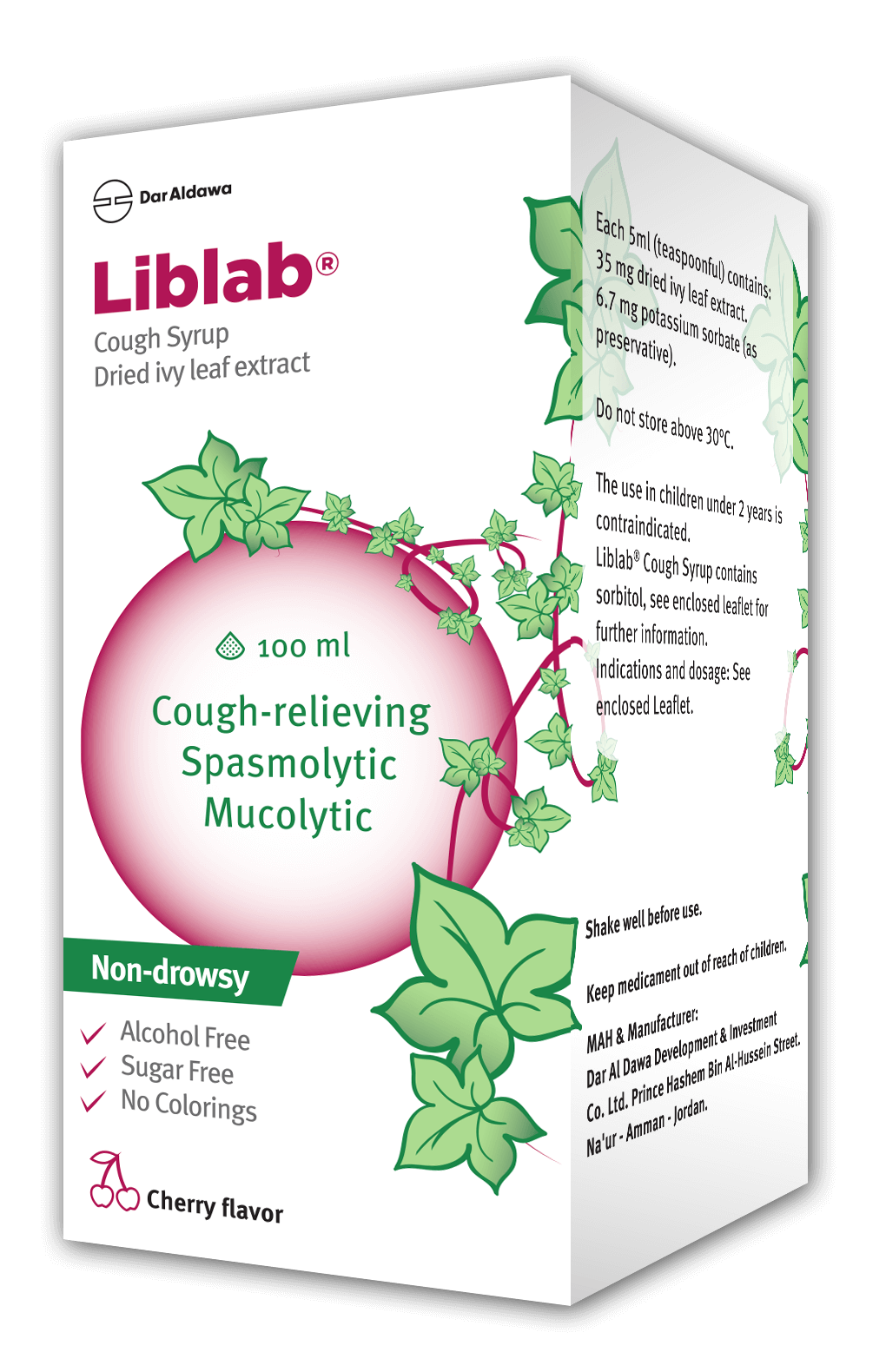Liblab® Dried ivy leaf extract
| Dosage form | Active Ingredient | Pack | |
| Syrup | Dried Ivy Leaf Extract 35 mg/5ml | Bottle 100 ml | |
| Lozenges | Dried Ivy Leaf Extract 35 mg | Blister 20 |
1. WHAT LIBLAB® COUGH SYRUP IS AND WHAT IT IS USED FOR
Liblab® Cough Syrup is a herbal medicine used to treat catarrhal diseases of the respiratory tract by its secretolytic, bronchospasmolytic and cough-relieving effects.
Liblab® Cough Syrup causes thick mucus to become liquefied, thereby making it easier to cough up. At the same time, the urge to cough is reduced. In this way, Liblab® combats the typical symptoms of bronchitis: excessive production of thick mucus, shortness of breath and the urge to cough, thereby allowing the patient to breathe freely again.
Liblab® Cough Syrup is used to improve symptoms of chronic-inflammatory bronchial diseases; acute inflammations of the respiratory tract accompanied by coughing.
Note: In the event of persistent complaints or the appearance of
shortness of breath, fever as well as purulent or bloody expectoration,
2. BEFORE YOU TAKE LIBLAB® COUGH SYRUP
• Do not take Liblab® cough syrup
− If you are hypersensitive (allergic) to the active substances or any of the other ingredients of Liblab®.
− Children under 2 years of age because of the general risk of aggravation of respiratory symptoms through secretolytic drugs.
a doctor should be consulted immediately.
• Take special care with Liblab® cough syrup
– Persistent or recurrent cough in children between 2-4 years of age requires medical diagnosis before treatment.
– When dyspnoea, fever or purulent sputum occurs, a doctor or a pharmacist should be consulted.
– Caution is recommended in patients with gastritis, or gastric ulcer.
• Taking other medicines, herbal or dietary supplements
Please tell your doctor or pharmacist if you are taking or have recently taken any other medicines, including medicines obtained without prescription.
No interactions have become known so far; however, no studies have been carried out.
• Pregnancy and breast-feeding
Medicines should generally be taken during pregnancy and breast-feeding only after having previously consulted a doctor.
However, there have not been sufficient studies performed on pregnant women and mothers who breastfeed.
• Driving and using machines
No special precaution are needed
• Important information on certain other ingredients of Liblab®
cough syrup
Liblab® cough syrup contains sorbitol. If you have been told by your doctor that you have intolerance to some sugars, contact your doctor before taking this medicinal product.
3. HOW TO TAKE LIBLAB® COUGH SYRUP
Always take Liblab® exactly as described in this leaflet. You should check with your doctor or pharmacist if you are not sure. Unless otherwise prescribed by your doctor, the usual dose is:
| Age | Single dose | Single dose |
| Children | 2.5 ml (half a teaspoonful) | 5 ml (2×2.5 ml) |
| between 2-5 | corresponding to 17.5 mg | corresponding to 35 mg |
| years of age | dried ivy leaf extract | dried ivy leaf extract |
| Children aged | 5 ml (one teaspoonful) | 10 ml (2×5 ml) |
| 12-Jun | corresponding to 35 mg | corresponding to 70 mg |
| Children aged | dried ivy leaf extract | dried ivy leaf extract |
| 12 and above, | 5 ml (one teaspoonful) | 15 ml (3×5 ml) |
| adults | corresponding to 35 mg | corresponding to 105 mg |
| dried ivy leaf extract | dried ivy leaf extract |
The use in children under 2 years is contraindicated. Method of use:
Take the solution in the mornings, (at noon) and in the evenings. How long you should keep taking Liblab® cough syrup Length of treatment is dependent on the nature and severity of your condition. However, even in the case of mild inflammation of the respiratory tract, treatment should last for one week at least. In the interest of ensuring that your recovery is permanent and complete, it is recommended that you should keep taking Liblab® for another 2-3 days after your symptoms have disappeared. If the symptoms persist longer than one week during the use of the Liblab®, a doctor or a pharmacist should be consulted. If you have the impression that the effect of Liblab® is too strong or too weak, talk to your doctor or pharmacist. Shake well before use. • If you take more Liblab® cough syrup than you should Do not exceed the recommended daily dose. Ingestion of significantly higher amounts (more than three times the daily dose) may lead to nausea, vomiting, diarrhea and agitation. In this case, you should consult your doctor. • If you forget to take Liblab® cough syrup Do not take a double dose to make up for a forgotten dose. Simply continue to take Liblab® as prescribed by your doctor or as directed in this leaflet.
4. POSSIBLE SIDE EFFECTS
Like all medicines, Liblab® can cause side effects, although not everybody gets them. Side effects with a frequency not known
Allergic reactions (urticaria, skin rash, dyspnoea, anaphylactic reaction) .
Gastrointestinal reactions (nausea, vomiting and diarrhea), and there may be a laxative effect due to the sorbitol content.
If any of the side effects gets serious, or if you notice any side effects not listed in this leaflet, please tell your doctor or pharmacist.
5. HOW TO STORE LIBLAB® COUGH SYRUP
Keep medicament out of reach of children. Do not store above 30° C.
Do not use Liblab® cough syrup after the expiry date, which is stated on the carton after “EXP”: The expiry date refers to the last
day of that month.
Medicines should not be disposed of via wastewater or household waste. Ask your pharmacist how to dispose of any medicines no
longer required. These measures will help to protect the environment.
